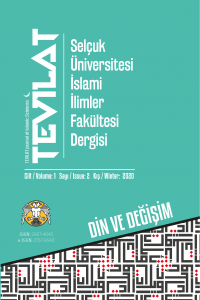THE EXAMINATION AND EVALUATION OF THE NARRATION “RECTIFYING AL-MUNKAR BY HAND, TOUNGE AND HEART” IN REGARD TO ITS AUTHENTICITY
Abstract
Throughout the Islamic history, the principle of ‘amr bi’l ma’rūf wa nahy an al-munkar (promoting the good and preventing the evil), has been the primary factor that constituted the basis of Muslim societies by ensuring an alive auto-control mechanism. One of the most important sustaining basis of mentioned principle, is the narration which enjoins the change of evil (al-munkar) by hand, tongue, and heart. Furthermore, it is in no disguise that today’s world, more than ever, is in dare need of understanding and remembering the similar narrations that Islam commands; and thus try not to stay silent and hence take a reaction against the behaviours that which are contrary to Islamic principles, at their best.
On the one hand, the concept of al-munkar, which is stated in the narration, is examined; its definition, and usage in the Qur’ān are taken into consideration primarily. Secondly, the chain of narration is evaluated throughout this article. Moreover, in the scope of the textual examination of the narration, taking sermons (kḥutbah) before the prayer during the eid feasts- which is seen as a contradiction to the sunnah-, the preferential actions to be taken within the context of the principle of ‘amr bi’l ma’rūf wa nahy an al-munkar’ against al-munkar, the importance of the order made by the Prophet to replace the munkar by hand, tongue and heart; and the meaning of the expression “weakest point of faith” and the similar subjects have been examined interrelatedly.
References
- Abd b. Hümeyd b. Nasr, Ebû Muhammed, el-Müntehȃb min Müsned-i Abd b. Hümeyd, Kahire: Mektebetü’s-Sünne, 1408/1988.
- Abdurrezzȃk b. Hemmȃm es-Semȃnȋ. el-Musannef. 2 Cild. Beyrut: el-Mektebetü’l-İslȃmȋ, 1403.
- Ahmed b. Hanbel, Ebû Abdillah Ahmed b. Muhammed b. Hanbel. el-Müsned. 50 Cild. Müessesetü’r-Risȃle, 1420/1999. Aliyyü’l-Kȃrȋ, Ebu’l-Hasen Nûrüddin Ali b. Sultan, Mirkȃtü’l-Mefȃtȋh Şerh-u Misbȃhi’l-Mesȃbȋh, y.y. trz.
Abstract
İslam Tarihi boyunca ‘‘Emr-i bi’l-ma’rûf ve nehy-i ani’l-münker’’ ilkesi, müslüman toplumların otokontrol mekanizmalarının canlı kalmasını sağlayarak bu toplumların temel dinamiğini oluşturan faktörlerin başında gelmiştir. Söz konusu ilkeyi ayakta tutan en önemli dayanaklardan biri ise münkerin el, dil ve kalp ile değiştirilmesini emreden rivȃyettir. Günümüz dünyasının, İslam’ın ortaya koyduğu dünya görüşü ve değer yargılarına aykırı olan tutum ve davranışlara karşı sessiz kalmayarak gücü nisbetinde tepkiler vermeyi emreden bu ve benzeri rivayetleri anlayıp hatırlamaya her zamankinden daha fazla ihtiyaç duyduğu aşikardır.
Bu makalede öncelikle rivȃyette geçen münker kavramının tanımı ve Kur’an’da kullanımı üzerinde durulmuş, daha sonra rivȃyetin isnȃd açısından değerlendirmesi yapılmıştır. Makalede rivȃyetin metin değerlendirmesi kapsamında bayram namazlarında hutbelerin sünnete muhalif olarak namazdan önceye alınması, münker karşısında emr-i bi’l-ma’rûf ve nehy-i ani’l-münker ilkesi kapsamında öncelikle yapılması gereken hususlar, Hz. Peygamber’in rivȃyette münkerin el-dil-kalp ile değiştirilmesine yönelik yaptığı sıralamanın önemi ve rivȃyette geçen ‘imanın en zayıf noktası’ ifadesinin anlamı gibi konular üzerinde durulmuştur.
References
- Abd b. Hümeyd b. Nasr, Ebû Muhammed, el-Müntehȃb min Müsned-i Abd b. Hümeyd, Kahire: Mektebetü’s-Sünne, 1408/1988.
- Abdurrezzȃk b. Hemmȃm es-Semȃnȋ. el-Musannef. 2 Cild. Beyrut: el-Mektebetü’l-İslȃmȋ, 1403.
- Ahmed b. Hanbel, Ebû Abdillah Ahmed b. Muhammed b. Hanbel. el-Müsned. 50 Cild. Müessesetü’r-Risȃle, 1420/1999. Aliyyü’l-Kȃrȋ, Ebu’l-Hasen Nûrüddin Ali b. Sultan, Mirkȃtü’l-Mefȃtȋh Şerh-u Misbȃhi’l-Mesȃbȋh, y.y. trz.
Details
| Primary Language | Turkish |
|---|---|
| Subjects | Religious Studies |
| Journal Section | Research Articles |
| Authors | |
| Publication Date | December 31, 2020 |
| Published in Issue | Year 2020 Volume: 1 Issue: 2 |
TEVILAT is licensed under a Creative Commons Attribution-NonCommercial 4.0 International License (CC BY NC).


